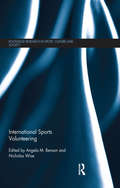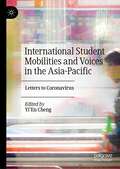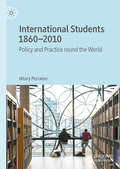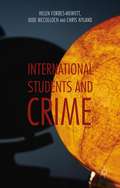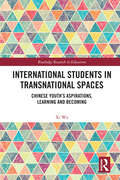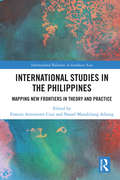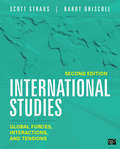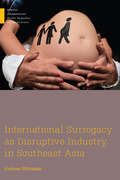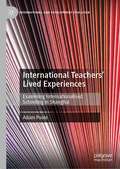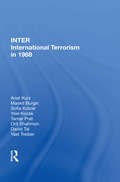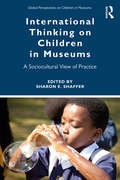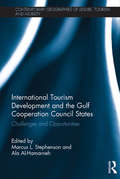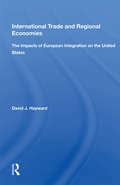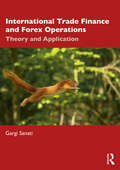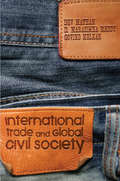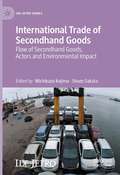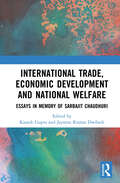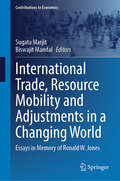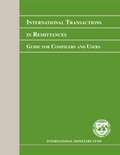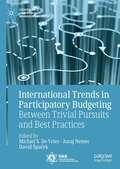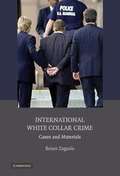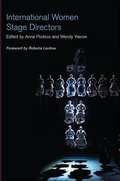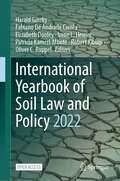- Table View
- List View
International Sports Volunteering (Routledge Research in Sport, Culture and Society)
by Nicholas Wise Angela M. BensonSport volunteering is becoming an increasingly popular motive for international travel. Many tourism organisations now advertise sport volunteering projects, with colleges and universities also offering students the opportunity to participate in similar projects abroad. This is the first book to bring together diverse and interdisciplinary insights into the development of the contemporary sport volunteering phenomenon. It addresses conceptual uncertainties and challenges emerging from the growing international sport volunteering market, and offers insight into its future directions, impact and sustainability. Drawing on both quantitative and qualitative methodologies, Part I examines volunteering in the context of international sporting events, while Part II evaluates volunteering initiatives related to sport development. Including case studies from Australia, Cameroon, Namibia, Norway, Russia, the UK, the US and Zambia, this substantial volume provides a truly international perspective on the changing roles of sport volunteering. Showcasing the latest research from across the globe, International Sports Volunteering is a valuable resource for any course on sport studies, sport event management, sport development, sport tourism, sport geography, the sociology of sport or leisure studies.
International Student Mobilities and Voices in the Asia-Pacific: Letters to Coronavirus
by Yi’En ChengThis edited volume explores core questions on education and transnational mobility in a time characterized by a global pandemic, recasting them through the lenses of regimes, experiences, and aspirations. The volume brings together 19 short essays in the form of letters addressed to the coronavirus and written by international students , together with nine striking illustrations that depict emotive scenes from the essays, and nine academic commentaries that analytically link these personal narratives to broader societal structures. This book represents a timely intervention, providing an intimate glimpse into young people’s hopes and the challenges they face concerning their education and mobility.
International Students 1860–2010: Policy and Practice round the World
by Hilary PerratonThis book describes how the number of international students has grown in 150 years, from 60,000 to nearly 4 million. It examines the policies adopted towards them by institutions and governments round the world, exploring who travelled, why, and who paid for them. In 1860 most international students travelled within Europe; by 2010 the largest numbers were from Asia. Foreign students have shaped the universities where they studied, been shaped by them, and gone on to change their own lives and societies. Policies for student mobility developed as a function of student demand and of institutional or national interest. At different times they were influenced by the needs of empire, by the cold war, by governments' search for soft power, by labour markets, and by the contribution students made to university finance. Along with university students, others travelled abroad to study: trainee nurses, military officers, the most deprived and the most privileged schoolchildren. All their stories are a vital part of the world's history of education and of its broader social and political history.
International Students and Crime
by Helen Forbes-Mewett Jude Mcculloch Chris NylandInternational students and crime is of major international concern, impacting on lucrative international student markets, international relations, host countries' reputations as tolerant and safe, and on the security of students and the public. While crimes against and by international students have attracted a deal of media attention and discussion internationally, there is little research that systematically describes, analyses and reflects on the phenomena. International Students and Crime analyses a spectrum of crime from petty theft to kidnapping and murder, presenting vital knowledge about international students as victims and perpetrators of crime in the US, the UK and Australia. It highlights the largely hidden phenomena of crimes against female international students and strategies students use to stay safe. Examining the different approaches to student safety in host countries, the book considers the ways in which governments, higher education providers and police approach and implement their responsibilities for international student safety.
International Students in Transnational Spaces: Chinese Youth’s Aspirations, Learning and Becoming (Routledge Research in Education)
by Xi WuXi Wu examines how national and transnational forces and discursive logic mediate international secondary school students’ educational routes and life trajectories. Drawing upon an ethnographic research program involving Chinese students in a Canadian international secondary school, Wu employs Ong’s notion of transnational cultural logics to examine students’ lives and how they flexibly and not-so-flexibly engaged in their learning and self-making in their transnational spaces. The book provides a comprehensive understanding of international students as agentic and socially regulated subjects in their transnational routes. These insights contribute to advancing curriculum and program improvements. Furthermore, Wu applies theoretical notions of "transnationalism" and "global and transnational cultural logics" to the examination of specific phenomenon, and analyzes how cultural logics stemming from families, nations, and societies govern subjectivities in their actions and aspirations. This insightful book will be of interest to a wide range of education stakeholders, as well as scholars and researchers in comparative and international education.
International Studies in the Philippines: Mapping New Frontiers in Theory and Practice (International Relations in Southeast Asia)
by Nassef Manabilang Adiong Frances Antoinette CruzHow can local experiences and the social transformation generated by modernity help to enrich our understanding of the international? What might a version of the much-discussed "non-Western International Relations (IR)" look like? What continuities and discontinuities from the Philippine experience in particular can be useful for understanding other post-colonial polities? The Philippines makes a fascinating case study of a medium-sized, developing, post-colonial, multi-ethnic and multi-cultural state in Southeast Asia. Cruz, Adiong and their contributors map horizons of non-Western approaches in Philippine experiences of IR, rooted in the Global South, and in local customs and practice. Examining both theory and praxis, they explore issues as diverse as pre-colonial history, diplomacy, religion, agrarian reform and the Philippines’ relationship with key regions in the Global South. The book will appeal to researchers interested in Southeast Asian Studies and alternative perspectives on IR.
International Studies: Global Forces, Interactions, and Tensions
by Scott A. Straus Barry DriscollThe challenge of teaching international studies is to help students think coherently about the multiple causes and effects of global problems. In International Studies: Global Forces, Interactions, and Tensions, award-winning scholars Scott Straus and Barry Driscoll introduce students to the foundations of the course; the major actors, institutions and theories; as well as the contemporary problems that will matter most to students. In the fully updated Second Edition, the authors give students a clear framework that pinpoints how key factors—forces, interactions, and tensions—contribute to current world events and global problems like human rights abuses, economic inequality, pandemic and global health responses, and food security. The book raises the bar for the Introduction to International Studies course and is relevant to students from a wide variety of backgrounds with diverse interests in geography, sociology, political science, and anthropology. Included with this text The online resources for your text are available via the password-protected Instructor Resource Site.
International Studies: Global Forces, Interactions, and Tensions
by Scott A. Straus Barry DriscollThe challenge of teaching international studies is to help students think coherently about the multiple causes and effects of global problems. In International Studies: Global Forces, Interactions, and Tensions, award-winning scholars Scott Straus and Barry Driscoll introduce students to the foundations of the course; the major actors, institutions and theories; as well as the contemporary problems that will matter most to students. In the fully updated Second Edition, the authors give students a clear framework that pinpoints how key factors—forces, interactions, and tensions—contribute to current world events and global problems like human rights abuses, economic inequality, pandemic and global health responses, and food security. The book raises the bar for the Introduction to International Studies course and is relevant to students from a wide variety of backgrounds with diverse interests in geography, sociology, political science, and anthropology. Included with this text The online resources for your text are available via the password-protected Instructor Resource Site.
International Surrogacy as Disruptive Industry in Southeast Asia (Medical Anthropology)
by Andrea WhittakerDuring the last two decades, a new form of trade in commercial surrogacy grew across Asia. Starting in India, a “disruptive” model of surrogacy offered mass availability, rapid accessibility, and created new demands for surrogacy services from people who could not afford or access surrogacy elsewhere. In International Surrogacy as Disruptive Industry in Southeast Asia, Andrea Whittaker traces the development of this industry and its movement across Southeast Asia following a sequence of governmental bans in India, Nepal, Thailand, and Cambodia. Through a case study of the industry in Thailand, the book offers a nuanced and sympathetic examination of the industry from the perspectives of the people involved in it: surrogates, intended parents, and facilitators. The industry offers intended parents the opportunity to form much desired families, but also creates vulnerabilities for all people involved. These vulnerabilities became evident in cases of trafficking, exploitation, and criminality that emerged in southeast Asia, leading to greater scrutiny on the industry as a whole. Yet the trade continues in new flexible hybrid forms, involving the circulation of reproductive gametes, embryos, surrogates, and ova donors across international borders to circumvent regulations. The book demonstrates the need for new forms of regulation to protect those involved in international surrogacy arrangements.
International Teachers’ Lived Experiences: Examining Internationalised Schooling in Shanghai (International and Development Education)
by Adam PooleThis book explores the emerging and under-researched phenomenon of internationalised schooling in China. It focuses on a group of “accidental” teachers who fell into teaching through happenstance or necessity, a group of teachers increasingly seeking refuge in Chinese Internationalised Schools. Chinese Internationalised Schools cater to an affluent middle class in China, offering some form of international curriculum which is taught by host country Chinese nationals and expatriate teachers. Chapters focus on three dimensions of teachers’ lived experiences of working in these schools: the intercultural, which explores teachers’ negotiations of intercultural teacher identities; the precarious, which highlights the struggles they might face at work; and the resilient, which illustrates how teachers survive—and even thrive—in the position. The author identifies a complex interplay between surviving and thriving, giving rise to the concept of “sur-thrival.”
International Terrorism In 1988: International Terrorism In 1989
by Anat KurzThis report surveys international terrorism in 1988. It is the fifth annual survey of its kind published by the Jaffee Center for Strategic Studies' Project on Low intensity Varfare. As in previous years' reports, the current survey contains statistical data that delineate various aspects of international terrorism, as well as brief articles that a
International Thinking on Children in Museums: A Sociocultural View of Practice (Global Perspectives on Children in Museums)
by Sharon E. ShafferInternational Thinking on Children in Museums introduces current research, theory, and practice about young learners in museums around the world. The book imparts vital knowledge about the nature of childhood and children’s learning that will improve understanding of the very youngest museum-goers. Including contributions from practitioners, scholars, and consultants around the globe, this volume examines museum practices and children’s learning across a range of distinct cultural and geographic locales. The framework of the book is based on research and current thinking in the realm of developmental psychology, sociology, and anthropology, allowing the contributors to examine the evolution of early learning and children’s programs through a sociocultural lens. This broad-based look at international museum practices for children offers a rare view of the field from an important, but oft-neglected perspective: that of society and culture. International Thinking on Children in Museums will broaden understanding of museum practice across cultures and geographic regions and, as such, will be of interest to scholars and students engaged in the study of museum education, museum studies, and early learning. It should also provide a much-needed source of inspiration for museum practitioners working around the world.
International Tourism Development and the Gulf Cooperation Council States: Challenges and Opportunities (Contemporary Geographies of Leisure, Tourism and Mobility)
by Marcus L. Stephenson Ala Al-HamarnehThis book examines the challenges facing the development of tourism in the six member states of the Gulf Cooperation Council (GCC): Bahrain, Kuwait, Oman, Qatar, Saudi Arabia and the United Arab Emirates (UAE). This region, which largely comprises the Arabian Peninsula, possesses some of the fastest growing economies in the world and is remarkably unique. It shares similar associations and affinities: tribal histories, royal kinship, political associations, Bedu cultural roots, Islamic heritage, rapid urbanization, oil wealth, rentier dynamics, state capitalist structures, migrant labour, economic diversification policies and institutional restructuring. Therefore, this volume takes the study of tourism away from its normative unit of analysis, where tourism in the region is being examined within the context of the Middle East and the wider Islamic and Arab world, towards an enquiry focusing on a specific geo-political territory and socially defined region. Although international tourism development in the region embodies a range of challenges, complexities and conflicts, which are deeply contextualized in this volume, the approach overall does not endorse the normative ‘Gulf bashing’ position that has predominated within the critical enquiries in the region. It presents a forward-looking and realistic assessment of international tourism development, examining development potentialities and constructive ways forward for GCC states and the region as a whole. This edited volume provides a real attempt to examine critically ways in which tourism and its development intersect with the socio-cultural, economic, political, environmental and industrial change that is taking place in the region. By doing so, the book provides a theoretically engaged analysis of the social transformations and discourses that shape our contemporary understanding of tourism development within the GCC region. Moreover, it deciphers tourism development’s role within the context of the GCC states undergoing rapid transformation, urbanization, ultra-modernization, internationalization and globalization. In addition to state-specific illustrations and destination case studies, the work provides insights into relatable themes associated with international tourism development in the region, such as tourism’s relationship with religion, heritage and identity, the environment and sustainability, mobility and cross-border movements, the transport industry, image production and destination branding, mega-development and political stability and instability. The book combines theory with diverse case study illustrations, drawing on disciplinary knowledge from such fields as sociology, political economy and social geography. This timely and original contribution is essential reading for students, researchers and academics in the field of tourism studies and related subject areas, along with those who have regional interests in Middle East studies, including Gulf and Arabian Peninsula studies.
International Trade And Regional Economies: The Impacts Of European Integration On The United States
by David J. HaywardThis book considers the issue of regional exposure to external economic events, exploring the role of trade in the performance of American states. It focuses on the case of trade with the European Community, analyzing the potential impacts of its integration on trade with individual states. .
International Trade Finance and Forex Operations: Theory and Application
by Gargi SanatiThis book bridges the existing gap between the theory and practices related to international finance. It discusses banking theories and operational procedures relating to the methods of payment with special reference to Letters of credit (LCs), like revolving LCs, back-to-back LCs, transferable LCs, and standby LCs, with specific applications of documentary discrepancies. Moreover, this book discusses merchanting trade, buyers’ credit and supplier’s credit, and bank guarantees with many practical caselets, linked to the applications of the International Chamber of Commerce (ICC) and other regulatory rules. It also examines the various roles of banks in financing international trade which are extensively discussed through several cases.This volume: Explains in-depth the intricacies and discrepancies relating to the documentation involved in international trade Presents in detail the various steps of executing an export or import deal, right from signing of the contract, managing pre-shipment credit, and booking a forward contract to hedge the exchange rate risk till the closing of the deal Gives a comprehensive account of all trade finance products with processes and procedures, rules, and regulations, and risks and mitigates Discusses the application of ICC rules through detailed case-lets, which helps an exporter take necessary actions when the payment is denied by a party overseas, or how an importer can simply deny the payment if there is documentary noncompliance Scrutinises different types of forex transactions, the regulatory framework within which they take place, and the associated risks and solutions Attempts to resolve the existing disparity in the understanding and interpretation of regulatory guidelines and the practices adopted by banks and corporate houses in implementing them. Accessibly written, this book will be useful to students, researchers, and teachers from the fields of management, business studies, international trade and treasury operations, finance, international banking, trade and commerce, and economics. This will also be an invaluable companion to the professionals working in export–import businesses, foreign exchange businesses, treasury front-office and back-office operations, bureaucrats, and public policymakers.
International Trade and Global Civil Society
by Dev Nathan D Narasimha Reddy Govind KelkarThis study challenges the dominant tendency of civil society to negate international trade as such. The authors argue that it is necessary to frame differentiated trade rules based on levels of economic development, and also to shift from subsidies to shore up uncompetitive livelihoods to productivity-enhancing investments.Most importantly, the book ends with a case for trade unions, women's organizations and other civil society organizations to imagine and create themselves as being global -- in order to take up the challenge of strengthening global countervailing power to capital.
International Trade of Secondhand Goods: Flow of Secondhand Goods, Actors and Environmental Impact (IDE-JETRO Series)
by Shozo Sakata Michikazu KojimaThis book demonstrates the flow of the international trade of secondhand goods and examines the socio-economic background and mechanisms of the trade. It highlights the actors involved in the trade of secondhand goods and how traditionally secondhand good have largely been traded through social or ethnic networks in order to effectively transfer quality and market information. The development of information technology and emergence of new information platforms have changed these business models. The policies and regulations relating to the trade of secondhand goods are explored, alongside the negative impact of these trades, and the growing awareness of the circular economy. This book illustrates how importing countries as well as international institutions have developed regulations in order to balance these two issues. It will relevant to students and economists interested in development economics and economics geography.
International Trade, Economic Development and National Welfare: A General Equilibrium Approach
by Kausik Gupta and Jayanta Kumar DwibediThis book presents a comprehensive analysis of contemporary issues in international trade and economic development. Emphasising the significance of economic development within policymaking, the book covers important issues like the provisioning of public goods, its implication in a liberalised regime, crime and corruption, skilled–unskilled wage inequality, income distribution and unemployment, environmental regulation and role of educational capital and informal sector. The volume deals with the impact that different aspects of international trade and investment are likely to have on the above-mentioned areas. The essays, written to honour the memory of Professor Sarbajit Chaudhuri, also examine topics that focus on public policy related to immigration of skilled workforce, political resistance and political compulsions that a democratic government might face in keeping with its commitment to tariff reforms, gender wage gap and issues related to globalisation, income distribution and unemployment. The book will be of invaluable interest to postgraduate students, scholars and researchers of development economics, international economics and labour economics and to those working on theoretical research on applications of general equilibrium trade models in developing countries.
International Trade, Resource Mobility and Adjustments in a Changing World: Essays in Memory of Ronald W. Jones (Contributions to Economics)
by Sugata Marjit Biswajit MandalThis volume mainly focuses on the relevance and application of Heckscher-Ohlin Model and Specific Factors Model of trade, while also addressing other latest global issues which are connected with two most celebrated structures of trade models developed by the legendary trade theorist Prof. Ronald Winthrop Jones. The two models were published as 'The Structure of Simple General Equilibrium Models' (1965) and 'A Three Factor Model in Theory, Trade and History' (1971). Both the structures are used extensively by trade economists and development economists to decipher a bunch of interesting and intertwined ideas. The models being easy to follow, are capable of explaining some contemporary global concerns if modified judiciously. This includes both theory and policy in both competitive and imperfectly competitive markets. It also has some empirical dimensions. This book is a must read for those who want to keep abreast of latest frontiers in the domain of research on internationaltrade theory and policy, especially advanced graduate students, researchers, and policy makers in general. It exposes its readers to methodological techniques and contemporary research issues so that one can easily draw clues, in terms of both relevant techniques and future research directions, to carry on their own research; policy makers can understand the channels of possible welfare improvement owing to new policy changes.
International Transactions in Remittances
by International Monetary FundIn a number of developing economies, remittances have become an important and stable source of funds that exceeds receipts from exports of goods and services or from financial inflows on foreign direct investment. This manual provides detailed assistance on the compilation of remittances. It is the first compilation guide based on the concepts set out in the sixth edition of the Balance of Payments and International Investment Position Manual. Chapters give background on demography, transaction channels, and legal and regulatory issues, and explain underlying concepts. The book then details data sources and estimation methods, and discusses compilation, data-processing, and dissemination issues. It includes a glossary of terms. The book was authored by members of the Luxemboug Group on Remittances, a working group composed of representatives of the International Monetary Fund, the Organization for Economic Cooperation and Development, the Statistical Office of the European Communities, the World Bank, and representatives from national statistical offices and central banks from economies around the world. Annotation c2010 Book News, Inc. , Portland, OR (booknews. com)
International Trends in Participatory Budgeting: Between Trivial Pursuits and Best Practices (Governance and Public Management)
by Michiel S. De Vries Juraj Nemec David ŠpačekThis book analyses the participatory budgeting practice as it has evolved in evaluated countries, focusing on what is substantially at stake concerning the budget and issues involved, the actual participation, the way such processes are organised and administered, and the outcomes of such processes. It concludes that participatory budgeting in selected European countries is far away from the level of ‘best practice’, but that all experiences are not just trivial pursuits. The information collected serves to check, to what extent participatory budgeting as practiced in the countries involved presents a real attempt to change municipal budgets towards addressing the needs of marginalized groups and to improve decision-making based on local democracy and participation, or whether these processes as such are to be judged to be more important than any output and outcomes. The practices can neither be seen as a process of policy diffusion nor as a process of policy mimesis. The terminology of participatory budgeting remains, but the tools to achieve the goals resulted only in marginal changes in the status quo in municipalities in European countries practicing participatory budgeting, instead of resulting in radical changes to increase spending in favor of marginalized groups.Chapter 15 'Unraveled Practices of Participatory Budgeting in European Democracies' is available open access under a CC BY 4.0 license.
International White Collar Crime
by Bruce ZagarisContemporary transnational criminals take advantage of globalization, trade liberalization, and emerging new technologies to commit a diverse range of crimes, and to move money, goods, services, and people instantaneously for purposes of pure economic gain and/or political violence. This book captures the importance of transnational business crime and international relations by examining the rise of international economic crime and recent strategies in the United States and abroad to combat it. The book is organized into three main sections. The first part discusses substantive crimes, particularly tax, money laundering, and counter-terrorism financial enforcement; transnational corruption; transnational organized crime; and export control and economic sanctions. The second part discusses procedural aspects of international white collar crime, namely extraterritorial jurisdiction, evidence gathering, extradition, and international prisoner transfer. The third part discusses the role of international organizations, including the United Nations, the World Bank Group, Interpol, and economic integration groups.
International White Collar Crime: Cases and Materials
by Bruce ZagarisContemporary transnational criminals take advantage of globalization, trade liberalization, and emerging new technologies to commit a diverse range of crimes, and to move money, goods, services, and people instantaneously for purposes of pure economic gain and/or political violence. This book captures the importance of transnational business crime and international relations by examining the rise of international economic crime and recent strategies in the United States and abroad to combat it. The book is organized into three main sections. The first part discusses substantive crimes, particularly tax, money laundering, and counter-terrorism financial enforcement; transnational corruption; transnational organized crime; and export control and economic sanctions. The second part discusses procedural aspects of international white collar crime, namely extraterritorial jurisdiction, evidence gathering, extradition, and international prisoner transfer. The third part discusses the role of international organizations, including the United Nations, the World Bank Group, INTERPOL, and economic integration groups.
International Women Stage Directors
by Wendy Vierow Anne FliotsosA fascinating study of women in the arts, International Women Stage Directors is a comprehensive examination of women directors in twenty-four diverse countries. Organized by country, chapters provide historical context and emphasize how social, political, religious, and economic factors have impacted women's rise in the theatre, particularly in terms of gender equity. Contributors tell the stories of their home country's pioneering women directors and profile the most influential women directors practicing today, examining their career paths, artistry, and major achievements. Contributors are Ileana Azor, Dalia Basiouny, Kate Bredeson, Mirenka Cechová, Marié-Heleen Coetzee, May Farnsworth, Anne Fliotsos, Laura Ginters, Iris Hsin-chun Tuan, Maria Ignatieva, Adam J. Ledger, Roberta Levitow, Jiangyue Li, Lliane Loots, Diana Manole, Karin Maresh, Gordon McCall, Erin B. Mee, Ursula Neuerburg-Denzer, Claire Pamment, Magda Romanska, Avra Sidiropoulou, Margaretta Swigert-Gacheru, Alessandra Vannucci, Wendy Vierow, Vessela S. Warner, and Brenda Werth.
International Yearbook of Soil Law and Policy 2022 (International Yearbook of Soil Law and Policy #2022)
by Harald Ginzky Irene L. Heuser Oliver C. Ruppel Elizabeth Dooley Robert Kibugi Patricia Kameri-Mbote Fabiano De Andrade CorrêaThis open access book presents an important discussion on the interface between sustainable soil management and climate mitigation and adaptation. It investigates a variety of aspects in this context, such as the political and societal consequences for countries in the Global South, an assessment of the outcomes of the UNFCCC Conference of Parties held in Glasgow, appropriate legal instruments to promote desealing, regulatory concepts for negative emissions in soil and land use, the debate in Europe on carbon uptake in soils and the climate-related policy of the Convention on Biological Diversity. Lastly, it provides information on recent court rulings on climate mitigation in Germany and Australia and their relevance for sustainable soil management.This sixth volume of the International Yearbook of Soil Law and Policy is divided into four parts, the first of which deals with various aspects of the theme “Climate Mitigation and Adaptation and Sustainable Soil Management.”The second part covers recent international developments, the third presents regional and national reports, and the fourth discusses overarching issues. Given the range of key topics covered, the book offers an indispensable tool for all academics, legislators and policymakers working in this field. The “International Yearbook of Soil Law and Policy” series discusses central questions in law and politics with regard to the protection and sustainable management of soil and land – at the international, national, and regional level.
